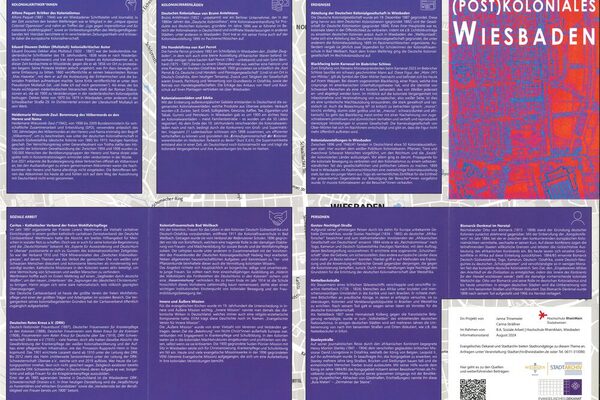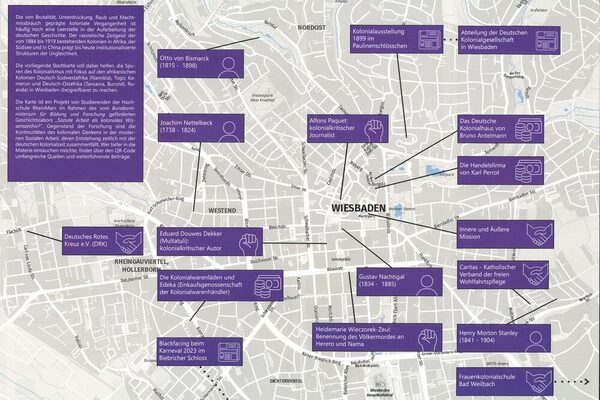Colonial history
Colonial history has not yet been extensively researched in Wiesbaden. Yet the age of colonialism and its ideologies are still visible in Wiesbaden's cityscape today. As part of the Biennale 2022, the Wiesbaden City Archive and the Protestant Deanery have created tours of places, people and events that shaped colonial endeavors between 1850 and the Second World War and are still visible in the cityscape today. The places, people and events document how Wiesbaden's urban society benefited from colonialism. Biographies of contemporaries who openly criticized colonial efforts were also presented.
One institution that is presented as part of the tours is the branch of the German Colonial House Bruno Antelmann. In 1898, the Berlin-based Deutsche Kolonialhaus Bruno Antelmann opened a branch in Wiesbaden, initially at Große Burgstraße 13. In 1907, the business was moved to Häfnergasse 11 (owner: Fritz Naglo). Bruno Antelmann and his wife Marie had a foster child from Togo, the later famous Quassi (Kwassi) Bruce. A child from Togo, seven-year-old Folivi, also worked in the Wiesbaden branch.
The Wiesbadener Tagblatt of January 28, 1900 reported on the celebrations for "Kaiser's birthday in the elementary schools". At the school on Schulberg, Folivi's teacher there and well-known Wiesbaden local poet Rudolf Dietz wrote a poem, which Folivi recited "for general amusement", according to the article.
The numerous colonial goods stores that were located in Wiesbaden around 1900 bore the colonial heritage in their names. A search in the Wiesbaden address book revealed around 50 stores in the city center alone. One of the stores was located at Kirchgasse 68 (formerly Kirchgasse 52). Today, the rich stucco decoration of the façade still reminds us of one of these stores, which opened in 1905. From around the 1890s, the merchant J. C. Keiper was based in this building with a company of the same name. Kirchgasse was renumbered in 1910. The house was given its current number.
From 1905, the colonial goods and delicatessen business J. C. Keiper is listed. The Wiesbaden address book indicates a change of ownership in this year. Merchant Klein was now the owner of the house and proprietor of the J.C. Keiper company.
In the context of the research project "Social Work as a Knowledge Archive?" led by Prof. Dr. Wiebke Dierkes, a city map "Postcolonial Wiesbaden" was created in the Department of Social Work at RheinMain University of Applied Sciences in 2024. The city map was developed by students Janna Trinemeier and Carina Sträßner (both Bachelor of Social Work) based on the tours created by the Protestant Dean's Office and the city archive.
The maps are available at the town hall, among other places, and are free of charge.

